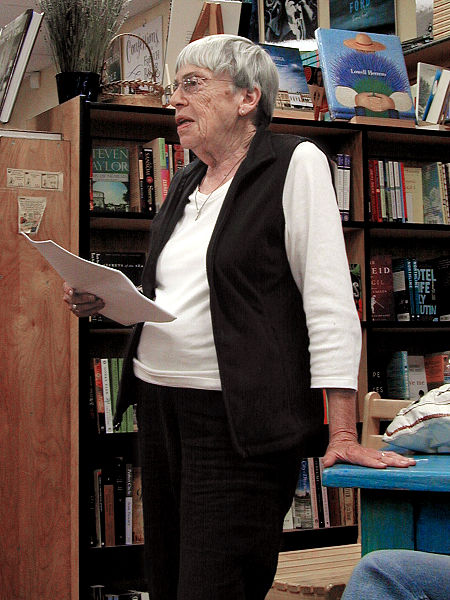Being effortlessly wise is a quality we generally associate with mystics, gurus, and people called The Dude. But if you’ve had a chance to hear what Ursula Le Guin has to say about genre writing, writing in general, or just the act of being a person in the world, you’ll feel like you’ve found your guru.
The latest issue of The Paris Review contains a fantastic interview with Le Guin, conducted by the author John Wray. A fan of genre literature and an equally big fan of Le Guin herself, Wray seemed to Socratically draw out some gems from Le Guin. Here are some highlights:
Part of what makes Le Guin such a compelling figure in this interview is how honest she is with what she did and didn’t know about writing, the world, and the importance of her work as it was happening. Most telling of all is the notion that Le Guin initially felt unaware that she was trapped in the male-dominated supposed “Golden Era” of science fiction, but broke free nonetheless. As she explains in the interview, many of her early works had male-protagonists, as though she was working inside a pre-established model for science fiction. But with one particular short book, The Eye of the Heron, Le Guin describes how her unconscious desire to break the mold pushed through. From the interview:
“My hero was from the Gandhian society, a nice young man. And then there was a girl, the daughter of the boss of the criminal society. And the nice young hero insisted on getting himself shot, about halfway through the book. And I said, Hey, you can’t do that! You’re my protagonist! My own unconscious mind was forcing me to realize that the weight of the story was in the girl’s consciousness, not the boy’s.”
She also beautifully summarizes the process of approaching The Left Hand of Darkness, and mentions she was not the first author to approach the subject of such a gender-bending imagined world:
“…Well gee, nobody’s done that. Actually, what I didn’t know is that, slightly before me, Theodore Sturgeon had written a book called Venux Plus X. It’s worth checking-out, a rare thing, an early male approach to considering gender as—at least partly—social constructed. Sturgeon was a talented warm-hearted writer, so it’s also interesting in itself. Stylistically, he was not a great writer, but he was a very good storyteller and a very good mind…”
This notion of exploratory themes repeating and manifesting themselves in different ways in science fiction is echoed in another passage in the interview:
“And one nice thing about science fiction—I think it’s still true, it certainly was when I came into the field—was that we could steal from one another quite freely, not in the plagiarizing sense, but in the ideas and how-to-do-something sense. What I always compare it to is baroque composers, who used to pass their ideas around all the time, even pass tunes around.”
Another small, and giddy detail from this interview: Le Guin went to high school with another totally famous science fiction writer! After talking a little bit about the (mostly) positive impact Philip K. Dick had on her, Le Guin mentions: “Did you know we were in the same high school?” Apparently she never actually met him then, and has confirmed with others who went to the high school that NO ONE really knew him. And even as adults, though she corresponded with him, she never met Dick in person.
Maybe this anecdote proves that sci-fi writer’s lives imitate the themes of their work. That Philip K. Dick was a ghost at Ursula Le Guin’s high school seems to oddly dovetail the image of Ray Bradbury and Ray Harryhausen as grade school chums, as much as it also relates to Harlan Ellison as a punk kid confronting Isaac Asimov at a convention. These connections seem correct, meaningful. Or as the interviewer John Wray mentions:
“That’s how one can identify a sci-fi author, I guess—tentacles coming out of the pigeonhole.”
To which Le Guin replies: “That’s right.”
The entire interview is chock-full of fantastic insight and cool anecdotes about Le Guin and her famous writing cronies. Ruining some of the awesome things she says at the end of the interview would be a crime. Grab one for yourself! In terms of discourse about genre colliding with literature, it doesn’t get much better than an interview like this.
Ryan Britt is a longtime contributor to Tor.com.










